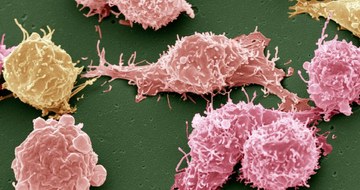Summary
Background
Olutasidenib (FT-2102) is a potent, selective, oral, small-molecule inhibitor of mutant isocitrate dehydrogenase 1 (IDH1). The aims for phase 1 of this phase 1/2 study were to assess the safety, pharmacokinetics, pharmacodynamics, and clinical activity of olutasidenib, as monotherapy or in combination with azacitidine, in patients with acute myeloid leukaemia or myelodysplastic syndrome, harbouring mutant IDH1.
Methods
In this phase 1/2, multicentre, open-label clinical trial, we enrolled patients aged 18 years or older with acute myeloid leukaemia or intermediate, high, or very high risk myelodysplastic syndrome harbouring mutant IDH1 at 18 study sites in the USA, Australia, France, and Spain. Other key eligibility criteria included Eastern Cooperative Oncology Group performance status 0–2 with adequate liver and renal function. The primary outcomes were dose-limiting toxicities and the maximum tolerated dose, maximum evaluated dose, and the recommended phase 2 dose of olutasidenib. Olutasidenib was administered orally in doses of 150 mg once daily, 150 mg twice per day, and 300 mg once daily. Azacitidine (75 mg/m2) was administered subcutaneously or intravenously daily for 7 days on, 21 days off. The study was ongoing at the data cutoff (Oct 2, 2019) and is registered with ClinicalTrials.gov
Findings
Patients were enrolled between Aug 8, 2016, and Nov 14, 2018. 78 patients received olutasidenib as monotherapy (n=32) or in combination with azacitidine (n=46). The median follow-up was 8·3 months (IQR 3·1–13·3) for monotherapy and 10·1 months (4·2–15·3) for combination therapy. 16 (50%) of 32 patients in the monotherapy group and 24 (52%) of 46 patients in the combination therapy group were women. Most patients were White (26 [81%] for monotherapy and 31 [67%] for combination therapy). No dose-limiting toxicities were reported in the dose-escalation cohorts and 150 mg twice per day was declared the recommended phase 2 dose on the basis of safety, pharmacokinetics and pharmacodynamics, and clinical activity. The most common (≥20%) grade 3–4 treatment-emergent adverse events with monotherapy were thrombocytopenia (nine [28%] of 32 patients), febrile neutropenia (seven [22%] of 32), and anaemia (seven [22%] of 32); and with combination therapy were thrombocytopenia (19 [41%] of 46), febrile neutropenia (13 [28%] of 46), neutropenia (13 [28%] of 46), and anaemia (nine [20%] of 46). 11 (34%) of 32 patients in the monotherapy group and nine (20%) of 46 patients in the combination therapy group died (most commonly from disease progression [three (9%) of 32 and four (9%) of 46]). No deaths were considered study-drug related. For patients with relapsed or refractory acute myeloid leukaemia, 41% (95% CI 21–64; nine of 22) receiving monotherapy and 46% (27–67; 12 of 26) receiving combination therapy had an overall response. For treatment-naive patients with acute myeloid leukaemia, 25% (1–81; one of four) receiving monotherapy and 77% (46–95; ten of 13) receiving combination therapy had an overall response.
Interpretation
Olutasidenib, with or without azacitidine, was well tolerated and showed meaningful clinical activity in patients with IDH1-mutated acute myeloid leukaemia. The results of this phase 1 study provide rationale for the continued evaluation of olutasidenib in multiple patient populations with myeloid malignancies.

